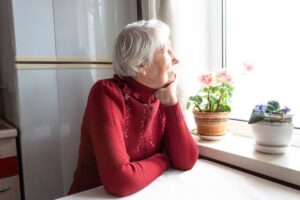
In a society experiencing accelerated aging, so-called “elderly orphanhood” is increasing in numbers. Unlike child orphanhood, this term is used for older adults who lack family support in their old age.
In a world where we are all heading toward aging, the absence of a care network can make this final stage a time filled with isolation, insecurity, and fragility.
Who Are the “Elderly Orphans”?
Elderly orphans have not always lived alone. Many of them had life partners, but were widowed, had no children, or lost them. Some have contact with distant relatives, but this contact is neither frequent nor close enough to enable them to turn to them in an emergency. Others are in a specific situation or live in different cities than their relatives.
Added to this, the preference for small families, the declining birth rate, and job-related relocations only worsen the situation. This has led to an increase in the number of older adults without a family support network who are forced to live their old age alone.
The Needs of Older Adults Without Family Support
Given their advanced age, being orphaned creates needs that go beyond the economic. While having money is important, human interaction, advice on medical and legal decisions, and simply companionship are essential for enjoying a dignified life.
In this scenario, some main needs of orphaned older adults are the following:
1. Access to Ongoing Healthcare
Not being able to access consultations, treatments, or medication due to not having someone to drive or accompany them can be a significant handicap.
2. Compliance With Bureaucratic Procedures
From utility payments to legal, banking, and administrative decisions, many require the support of a third party to carry them out.
3. Emotional Health Care
Loneliness is one of the most important risk factors for the mental health of older adults. This is also associated with vulnerability to depression, anxiety, and cognitive decline.
4. Home Security
Lack of support, assistance, or companionship can also result in an inability to adapt one’s home to one’s needs or an inability to resolve emergencies at home.
Support Alternatives for Orphaned Elderly People
One positive aspect of all this is that there are strategies you can try to assist older adults. However, greater social awareness, active public policies, and intersectoral coordination are necessary for them to be effective. Some of the most promising are:
1. Community Networks
Neighborhood organizations, day centers, parishes, or social organizations can be spaces where older adults find community, support, and companionship. Likewise, volunteering and intergenerational support programs can be a valuable alternative to avoid isolation.
2. Professional Care Services
From home caregivers to social workers, there are people trained to provide logistical, physical, and emotional support to the elderly. However, you should be aware that these types of services are often expensive and scarce. This may mean you may require state-subsidized programs or solidarity-funded models.
3. Technology as an Ally
For orphaned elderly people, technology is a tool they can use to communicate and manage tasks. Unfortunately, their age frequently makes them vulnerable to scams or information theft. To avoid this, many rely on tools like a Miami VPN. This way, they can protect their data and browse safely while addressing their needs.
4. Advance Planning
When working with elderly people without family, you should foster a culture of aging planning. This includes writing a will and powers of attorney to personal wishes. For those without close friends, it is necessary to collect their information to address any eventualities after their death.
5. Collaborative Housing Models
“Cohousing” or cooperative housing for seniors is emerging as a viable alternative for older adults. These models combine individual housing with shared spaces and services. This maintains a sense of community without compromising the independence of the elderly.
The Role of the State and Society
The orphanhood of older adults is not a private problem, but rather a social and structural challenge. Public policies related to the development of comprehensive caregiving systems that do not rely solely on the elderly person’s family must be fundamental.
At the same time, it is essential to adequately train medical, legal, and social work professionals. This is done with the goal of easily detecting warning signs in this segment of the population.
The creation of registries for older adults in public administration could also be considered. This would make it possible to generate action protocols for older adults who are alone or at risk of illness.
A Necessary Cultural Change
Beyond policies, a profound cultural change is necessary. Many still perceive old age with stigma. Therefore, recovering the image of the elderly as valuable beings, worthy of care, and with the right to live, is a significant first step.
Intergenerational solidarity is also key: young people accompany older adults in daily tasks by symbolically adopting elderly people without family members. These are examples of how the social fabric can weave networks of emotional protection.
Orphanhood in old age should not be synonymous with abandonment or loneliness. Environments where older adults without family members live with dignity, security, and affection depend on the creation of a collective consciousness and a social commitment to social innovation and technology. Old age, well accompanied, can be fulfilling, and it is up to us to make it possible.